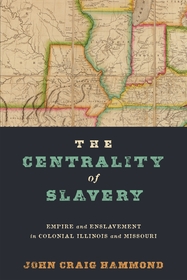
The Centrality of Slavery
Empire and Enslavement in Colonial Illinois and Missouri
Series: Early American Studies;
- Publisher's listprice GBP 36.00
-
17 199 Ft (16 380 Ft + 5% VAT)
The price is estimated because at the time of ordering we do not know what conversion rates will apply to HUF / product currency when the book arrives. In case HUF is weaker, the price increases slightly, in case HUF is stronger, the price goes lower slightly.
- Discount 10% (cc. 1 720 Ft off)
- Discounted price 15 479 Ft (14 742 Ft + 5% VAT)
Subcribe now and take benefit of a favourable price.
Subscribe
17 199 Ft

Availability
printed on demand
Why don't you give exact delivery time?
Delivery time is estimated on our previous experiences. We give estimations only, because we order from outside Hungary, and the delivery time mainly depends on how quickly the publisher supplies the book. Faster or slower deliveries both happen, but we do our best to supply as quickly as possible.
Product details:
- Publisher University of Pennsylvania Press
- Date of Publication 11 November 2025
- Number of Volumes Print PDF
- ISBN 9781512828429
- Binding Hardback
- No. of pages288 pages
- Size 229x152 mm
- Weight 666 g
- Language English
- Illustrations 5 b/w images, 2 maps 0
Categories
Long description:
How French and American colonizers created systems of enslavement in the Middle Mississippi Valley
The Centrality of Slavery examines how French and American colonizers used the powers of various imperial regimes to create slave societies in present-day Missouri and Illinois from the 1720s through the 1820s. The first book-length study of slavery and empire in both Illinois and Missouri, it begins with the origins of Native American and African American enslavement in the region. It then traces how successive French, Spanish, British, and American regimes shaped the development of slavery over the course of a century, examines the significance of the Northwest Ordinance's ban on slavery in Illinois, and then analyzes the diverging histories of slavery in Illinois and Missouri in the early 1800s. The book concludes with an analysis of the Missouri Crisis and the compromise of 1820, along with the Middle Mississippi Valley's significance in the road towards disunion and civil war in the late 1850s.
More broadly, The Centrality of Slavery argues that the Middle Mississippi Valley sat astride the crossroads of imperial North America. The practices of empire and enslavement forged and fought over there exerted an outsized influence on the history of slavery in North America and the United States. Rather than treating the region's eighteenth-century past as a prologue to the rise of the United States, John Craig Hammond analyzes the colonial history of the region on its own terms, through the European colonizers, American settlers, and enslaved people of Indigenous and African descent who shaped the development of slavery in the Middle Mississippi Valley.






